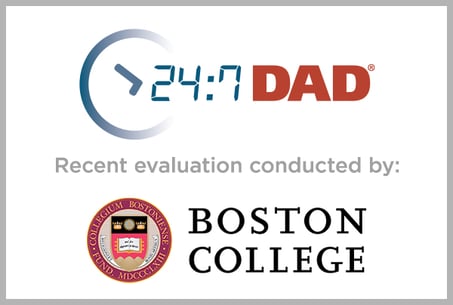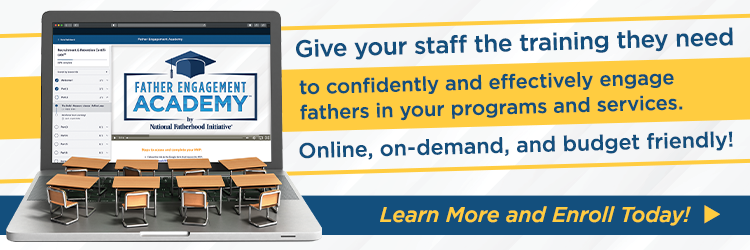
A new, independent, third-party evaluation of the evidence-based 24/7 Dad® program of National Fatherhood Initiative®(NFI) shows that it improves dads’ confidence in their ability to parent and that how much of the program they receive matters in building that confidence.
The program’s positive impact on dads’ confidence in parenting—known as parental self-efficacy—is not surprising. Other evaluations have found the same outcome. This study was the first to examine that dads’ level of participation—known as dosage—matters in building dads’ parental self-efficacy.*
That dosage matters is a vital finding for users of the program who have wondered whether it does, in fact, matter. Intuitively, it should. This evaluation confirms that intuition.
The Evaluation
The researcher examined the impact of the program on the parental self-efficacy of 32 resident and nonresident fathers in Hawai’i. She used a survey called the Self-Perception of the Parental Role (SPPR) Inventory to measure fathers’ self-efficacy before and after their participation in the program. Although a small sample of fathers, it was diverse:
- About half of the fathers were nonresident (52%) or resident (48%)
- Half of the fathers (50%) had a high school or equivalent (GED) education with the other half of fathers having some college or completed college (37%) or having not completed high school (13%)
- The largest racial group of fathers was White (around 26%), followed by Multiracial (around 25%), Native Hawaiian/Pacific Islander (around 23%), and Asian (around 13%)
The researcher divided fathers into four dosage groups based on the number of weekly sessions fathers attended out of the maximum 12 sessions:
- No dosage (0 sessions)
- Low dosage (1-4 sessions)
- Moderate dosage (5-9 sessions)
- High dosage (10-12 sessions)
She examined whether the impact of the program on self-efficacy differed based on several variables (e.g. father’s age, residency status, employment status, etc.).
The Findings
The researcher found a statistically significant positive association between participation dosage and parental self-efficacy. In other words, greater participation in 24/7 Dad® predicted a greater increase in parental self-efficacy. Moreover, parental self-efficacy was lower for nonresident fathers compared to resident fathers.
The researcher found no statistically significant difference between resident and nonresident fathers in the association between dosage and parental self-efficacy. In other words, greater participation was equally effective in increasing parental self-efficacy for resident and nonresident fathers.
The researcher concluded that:
“These results provide support for the effectiveness of 24/7 Dad® in increasing fathers’ confidence in their parenting role. This is an important contribution of 24/7 Dad® to the wellbeing of families, considering that research has shown that parental self-efficacy is lower among fathers than among mothers, but it is central to their ability to take more active, positive roles in their children’s lives.”
Moreover:
“[These] results provide support for the effectiveness of 24/7 Dad® in increasing fathers’ confidence in their parenting role among resident and nonresident fathers. This is another important contribution of 24/7 Dad® to the wellbeing of families, considering that men who believe that they can effectively manage parenting tasks are more likely to be involved fathers and, in turn, when both resident and nonresident fathers alike maintain positive father-child relationships and engagement in children’s activities, they may promote children’s positive outcomes and protect from negative ones.”
I encourage you to download, read, and share this evaluation. I also encourage you to download, read, and share other evaluations of 24/7 Dad®.
*Another evaluation of the program found that dosage matters in building the protective factors that reduce the risk that fathers will abuse or neglect their children. Click here to learn more about that evaluation.
